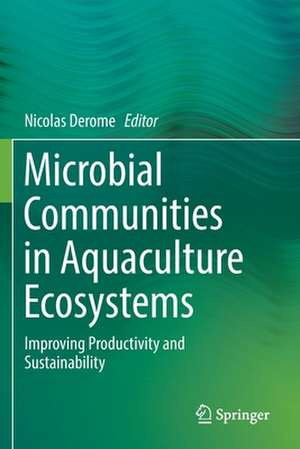Microbial Communities in Aquaculture Ecosystems: Improving Productivity and Sustainability
Editat de Nicolas Deromeen Limba Engleză Paperback – 14 aug 2020
The book also covers post-antibiotic approaches for preventing and treating opportunistic microbial infections based on harnessing environmental and fish-associated microbial communities. Furthermore, it explores how manipulating and engineering these complex microbial communities using bio-agents such as probiotics, phages, natural nutritional additives, or with fine-tuned biofilters will open the door for new ways to develop a more sustainable and cost-effective aquaculture industry. Including an accessible presentation of modern high-throughput sequencing technology to identify host-microbial interactions in aquaculture ecosystems, this book is a valuable resource for scientists, aquaculture and fishery experts, sustainability enthusiasts and scholars in the areas of biology and marine agriculture.
| Toate formatele și edițiile | Preț | Express |
|---|---|---|
| Paperback (1) | 938.66 lei 6-8 săpt. | |
| Springer International Publishing – 14 aug 2020 | 938.66 lei 6-8 săpt. | |
| Hardback (1) | 944.51 lei 6-8 săpt. | |
| Springer International Publishing – 24 iun 2019 | 944.51 lei 6-8 săpt. |
Preț: 938.66 lei
Preț vechi: 1144.71 lei
-18% Nou
Puncte Express: 1408
Preț estimativ în valută:
179.62€ • 188.00$ • 149.49£
179.62€ • 188.00$ • 149.49£
Carte tipărită la comandă
Livrare economică 01-15 aprilie
Preluare comenzi: 021 569.72.76
Specificații
ISBN-13: 9783030161927
ISBN-10: 3030161927
Pagini: 163
Ilustrații: VII, 163 p. 30 illus., 19 illus. in color.
Dimensiuni: 155 x 235 mm
Greutate: 0.25 kg
Ediția:1st ed. 2019
Editura: Springer International Publishing
Colecția Springer
Locul publicării:Cham, Switzerland
ISBN-10: 3030161927
Pagini: 163
Ilustrații: VII, 163 p. 30 illus., 19 illus. in color.
Dimensiuni: 155 x 235 mm
Greutate: 0.25 kg
Ediția:1st ed. 2019
Editura: Springer International Publishing
Colecția Springer
Locul publicării:Cham, Switzerland
Cuprins
The Rise and Fall of Antibiotics in Aquaculture.- Host-Microbiota Interactions and Their Importance in Promoting Growth and Resistance to Opportunistic Diseases in Salmonids.- Would Bacteriophages Be a New Old Complement to Antibiotics in Aquaculture?.- Controlling Factors for Community Assembly in Developing Cod Larvae (Gadus Morhua).- Insights into Mussel Microbiome.- Feed Additives, Gut Microbiota and Health in Finfish Aquaculture.- Feed Additives Impacts on Shellfish Microbiota, Health And Development.
Notă biografică
Dr. Nicolas Derome received his PhD in population genetics in 2002 from the University of Pierre et Marie Curie (UPMC, Paris VI) and from the École Pratique des hautes Études (EPHE) in France. He then worked as a postdoctoral fellow in functional genomics at the Institut de Biologie Intégrative et des Systèmes (IBIS, U. Laval, Québec, Canada) and, subsequently, served as an Assistant and Associate Professor at the Laval University in Québec. Since 2016, he has been a full Professor at Université Laval. His research team has pioneered metagenomics (16S rDNA and rRNA gene profiling, metagenomic and more recently metatranscriptomics) in various animal models, and contributed notably to the understanding of the interplay of biotic and abiotic factors that shape the ontogeny of fish microbiota in non-model species, in both natural and domestic populations. Dr Derome is involved in the development of probiotic formulation with endogenous bacterial probiotic strains to cure and prevent opportunistic diseases in finfish. Since 2012, Dr. Derome’s research team has published over 25 scientific papers, and disseminated his results in more than 100 presentations. He is also an Associate Editor of Microorganisms journal.
Textul de pe ultima copertă
This book sheds light on the major functions of microbial communities in aquaculture ecosystems, showing that by recycling nutrients, degrading organic matter and preventing disease outbreaks, a variety of microbes are truly beneficial to a wide range of aquaculture industries. It discusses how deteriorating environmental quality enables some microbial strains to trigger disease, describes the development of highly sustainable tools to improve water quality, and identifies crucial factors that endanger microbial homeostasis in aquaculture ecosystems.
The book also covers post-antibiotic approaches for preventing and treating opportunistic microbial infections based on harnessing environmental and fish-associated microbial communities. Furthermore, it explores how manipulating and engineering these complex microbial communities using bio-agents such as probiotics, phages, natural nutritional additives, or with fine-tuned biofilters will open the door for new ways todevelop a more sustainable and cost-effective aquaculture industry. Including an accessible presentation of modern high-throughput sequencing technology to identify host-microbial interactions in aquaculture ecosystems, this book is a valuable resource for scientists, aquaculture and fishery experts, sustainability enthusiasts and scholars in the areas of biology and marine agriculture.
The book also covers post-antibiotic approaches for preventing and treating opportunistic microbial infections based on harnessing environmental and fish-associated microbial communities. Furthermore, it explores how manipulating and engineering these complex microbial communities using bio-agents such as probiotics, phages, natural nutritional additives, or with fine-tuned biofilters will open the door for new ways todevelop a more sustainable and cost-effective aquaculture industry. Including an accessible presentation of modern high-throughput sequencing technology to identify host-microbial interactions in aquaculture ecosystems, this book is a valuable resource for scientists, aquaculture and fishery experts, sustainability enthusiasts and scholars in the areas of biology and marine agriculture.
Caracteristici
Integrates multiple sustainable approaches like probiotics, prebiotics, and recirculated water rearing systems in aquaculture Introduces phage therapy in aquaculture as a novel technique Offers research insights for practical optimasations in fishery and aquaculture
